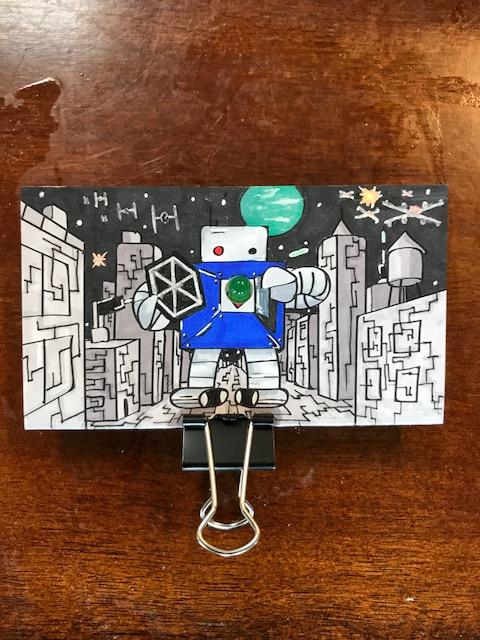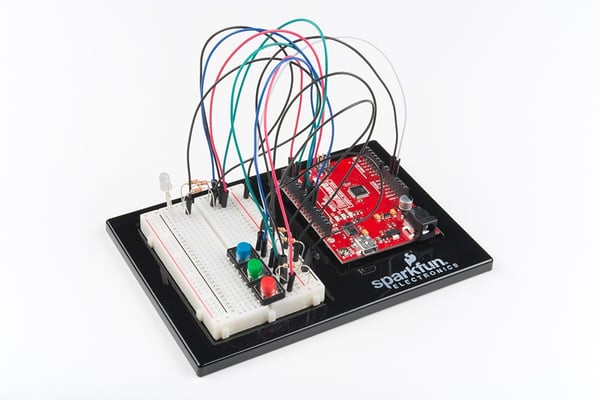Over the summer, SparkFun was lucky enough to have 2 great engineering interns. We didn't make them bring us coffee, but we did dropped them off in basically every department in the building to learn how products are made. They learned about ideation, design, part sourcing, production, shipping, support and more this summer. Now that their internship is almost over we thought we’d ask them about their experience and let them share with you.
Q: Tell us a little about yourselves and why you chose the SparkFun internship?
 Humsini: Hi my name is Humsini and I’m a senior at CU Boulder majoring in mechanical engineering and neuroscience through the Engineering Plus program, with a minor in Biomedical engineering. (I also like sharks and am a notoriously slow eater, but that doesn’t seem as pertinent.) I got to tour SparkFun as part of an engineering entrepreneurship class, and sufficient to say I had never seen a company, especially an engineering company, like it. In the best way possible, everyone was a huge, unabashed nerd. Not a 9-5 nerd, but a 24/7, hey, look at this cool thing I just made, nerd. Coming more from the biomedical research and humanitarian engineering side of things, the idea of engineering something for fun was kind of a foreign concept. (Don’t get me wrong, I love humanitarian stuff, but when I think of fun, cool engineering the words “FDA compliance” and “sand filtration” don’t exactly come to mind.) It was really refreshing to see a group of engineers and professionals infuse creativity and personality into their jobs and workspace, to see a company that took something as deep and wide as electrical engineering and put so much work into making it accessible to people of all electrical know-how levels. Ultimately, it was the combination of a unique opportunity to work in so many different departments, a chance to challenge myself and hopefully osmosis some of the creativity and tinkering skills from the people working here into myself, and, of course, the dogs.
Humsini: Hi my name is Humsini and I’m a senior at CU Boulder majoring in mechanical engineering and neuroscience through the Engineering Plus program, with a minor in Biomedical engineering. (I also like sharks and am a notoriously slow eater, but that doesn’t seem as pertinent.) I got to tour SparkFun as part of an engineering entrepreneurship class, and sufficient to say I had never seen a company, especially an engineering company, like it. In the best way possible, everyone was a huge, unabashed nerd. Not a 9-5 nerd, but a 24/7, hey, look at this cool thing I just made, nerd. Coming more from the biomedical research and humanitarian engineering side of things, the idea of engineering something for fun was kind of a foreign concept. (Don’t get me wrong, I love humanitarian stuff, but when I think of fun, cool engineering the words “FDA compliance” and “sand filtration” don’t exactly come to mind.) It was really refreshing to see a group of engineers and professionals infuse creativity and personality into their jobs and workspace, to see a company that took something as deep and wide as electrical engineering and put so much work into making it accessible to people of all electrical know-how levels. Ultimately, it was the combination of a unique opportunity to work in so many different departments, a chance to challenge myself and hopefully osmosis some of the creativity and tinkering skills from the people working here into myself, and, of course, the dogs.
 Jackson: My name is Jackson and I am currently a junior at CU Boulder majoring in Mechanical Engineering and minoring in Technology, Arts, and Media (TAM). I first heard about SparkFun when working with their products during my freshman year projects class. I later toured their headquarters with the same class and I can vividly remember thinking that I’d love to work there one day. Just after an hour or two, the culture at SparkFun became abundantly clear. Everyone had personal projects and creations on their desk. It was a group of makers, a collection of creators. The impulse to design and to make has always been a part of my life, which is why I chose to study engineering. Put simply, I want to make cool stuff. To be in an environment in which pursuing creative ideas is the norm was perfect for me.
Jackson: My name is Jackson and I am currently a junior at CU Boulder majoring in Mechanical Engineering and minoring in Technology, Arts, and Media (TAM). I first heard about SparkFun when working with their products during my freshman year projects class. I later toured their headquarters with the same class and I can vividly remember thinking that I’d love to work there one day. Just after an hour or two, the culture at SparkFun became abundantly clear. Everyone had personal projects and creations on their desk. It was a group of makers, a collection of creators. The impulse to design and to make has always been a part of my life, which is why I chose to study engineering. Put simply, I want to make cool stuff. To be in an environment in which pursuing creative ideas is the norm was perfect for me.
Q: What was your favorite part about the internship (other than the dogs)?
Humsini: The beer. (Just kidding.) For me, I loved the learning by doing. No textbooks involved. Just a lot of Googling, question asking, and mistake making. In everything from Eagle to micro:bit to warehouse logistics, it was so much more engaging to get to learn about these things by doing them. I’m an ardent believer in getting your hands dirty, and this internship was all mud pies. To theoretically know the importance of inventory control is much different than actually seeing the complexity of what that means and how that interfaces with every department. On a different end, it has been such an inspiration seeing all the amazing projects everyone does, and really falling down that rabbit hole of wanting to make cools things for the sake of making cool things. Sadly I think school really undervalues tinkering and maker projects. No, a project may not cure cancer or solve a grand challenge, but the physical act of going from “it would be cool if I could do x” to actually doing x, whether it works or not, has taught me much more than can be quantified in a Blue Book.
Jackson: This internship has provided extensive creative inspiration. I’ve had the chance to talk to many creatives at SparkFun and learn about their personal projects. I’ve also had the chance to work with new and interesting SparkFun products. This exposure has inspired me to pursue some projects of my own and given me the confidence to try even though I may fail. It doesn’t matter how simple or silly a project may seem, if it is interesting to me I know there is knowledge to be gained from pursuing it, whether the final result is successful or not.
Q: Which department was the biggest difference from what you were expecting and why?
Humsini: I know I’m being lame here, but each department was much different from what I was expecting, mainly because I didn’t know what to expect. I did not realize the scope of work that goes into making or selling a single product, and walking through each department gave me a deep appreciation for how absolutely essential they all are. I’d always thought design was the most important, but the logistics needed in order to make any of that possible was what surprised me the most. While designing something is by no means easy, the logistics of everything else that is needed, from part sourcing to build scheduling to margins to marketing to shipping to user support (the list really does go on) is something I deeply underappreciated before.
Jackson: I was most surprised by my time working with the support department. In all honesty, I expected a department that was largely independent from the rest of the company, one that focused on communication with the customer rather than communication with other departments. What I found was the opposite. The support department’s input makes every other part of the company run more efficiently. They come to product development with product issues noticed by customers. They’re some of the first ones to hear about shipping issues and kitting problems. SWIT can utilize the information support has gained about the effectiveness of the SparkFun website to make improvements. My experience with support speaks to the importance of interdepartmental communication. Even if there is no obvious connection between two departments, there is something to be gained from collaboration.
 Paper Circuit colored by Jackson
Paper Circuit colored by Jackson
Q: What did you learn? How would you summarize the experience as a whole?
Humsini: In short, a whole lot. Most importantly, I learned the importance of not sticking in a tunnel vision view of what’s best or most important for a product. Knowing the breadth of what a product goes through and the depth of what your role in that lifecycle is, is very important. Everything a department does affects all the other departments in one way or another, so open and honest communication is vital. I got to learn a lot about the business side of engineering, which in turn has affected how I think of engineering. Being able to see both the big picture (who is this product for, why are they buying it, how does this stack against competitors) and the details (is this solder joint possible, is the silkscreen intuitive, do we have the parts, can this even be shipped) is important so as to not snowball into larger problems down the pipeline. The second is that the workplace culture is also just as important. At its core, a company is its people, not its products. Just as much care and attention should be paid to the people as it is to the products, and I think SparkFun really showed me the best ways that can be done. The experience as a whole was like drinking water from a fire hose. By no means do I think I completely understand every department now, but I did gain a larger appreciation for the amount of collaboration, teamwork, and dedication that goes into SparkFun.
Jackson: This internship has consisted of spending time with all the major departments here at SparkFun. Within each department I’ve had a chance to learn about what they do, how they do it, and get hands on experience with related projects. I’ve also had the chance to get to know the people that work here and what they’re passionate about working on. Over the internship as a whole, I’ve learned countless standards and practices but a large portion of it all boils down to two major things. First, I learned about the importance of departments working together and communicating. My experiences in production, for example, helped me in quality control. Learning about the details of surface mount soldering allowed me to think differently about test bed design. I oriented components with the ease of soldering in mind. But this is just the tip of the iceberg, the examples are limitless. The transfer of information between departments is vital to the efficiency of a company as a whole. Second, I learned how passion and personality can add value to a workplace. At SparkFun, personal projects are highlighted on the SparkFun website and on social media. Those endeavors don’t hinder one's ability to get their work done, they enhance the culture of the workspace and embrace creativity amongst employees.
Q: Based on your experience what recommendations do you have for SparkFun and other companies looking to make a similar program as well as for students in these programs?
Humsini: I think internships always walk this fine line between menial busy work or being completely overwhelming. I liked that the projects we were given were challenging, but doable. The hands on projects were my favorite, and getting to learn practical technical skills like Eagle or soldering was something I really appreciated, especially since I can take those skills anywhere. In the non-engineering projects we did, I liked that we were asked to actually contribute ideas and be sort of a stand in employee for a week, instead of someone’s assistant. While I’ll leave it to those departments to see how much of a help we actually were, from my perspective I learned so much more about how to communicate ideas and actually plan out the implementation of those ideas. It was really nice feeling like my opinion was valued. Most importantly, however, I really appreciated how much everyone was willing to help and teach us, even people who weren’t in the particular department we were in.
As for students, I’d say take each day as a learning opportunity. Yes, you’re obviously there to learn about the company and learn different engineering practices, but you’re also there to learn about what you like. How important is company culture to you? Company structure? Do you like open offices? What kind of people do you like working with? Do you like being able to work from home? Do you like the work that you’re doing? Do you like being able to shoot coworkers with Nerf guns? These are all important questions. And in that vein, ask questions! I mean this for both the job you’re doing and for the people you’ll be working with. While no one’s experiences will be exactly right for you, it’s invaluable learning about all the different paths other people took after graduation, and how they all got there too. Plus, you get to hear some crazy stories from some cool people.
Jackson: It’s an investment to start an internship program. It’s up to both the company and the interns to make that investment worth it. I’m here at SparkFun to learn but I don’t want that learning to hinder the functionality of the company as a whole. My favorite projects here have been hands on assignments that make the jobs of SparkFun employees easier. In these cases, I get valuable experience while also aiding in the workload of my coworkers. In this way, it’s important that companies give their interns an opportunity to add tangible value instead of assigning solely menial tasks. Additionally, if a company hopes to hire an intern in the future, then the internship experience should cover multiple aspects of the company. This is something that SparkFun has excelled in. A diverse experience allows for more knowledgeable interns. I have had a chance to learn about nearly all departments here. With a larger understanding of the company as a whole, more focused tasks become increasingly informed.
For the intern, their goal should be to absorb as much information as possible. Try news things and learn something new. You may just love it. And don’t be afraid to ask questions and dig deeper. There is a wealth of information at your fingertips. Take full advantage of it!
 Color Mixer Circuit using SIK parts designed by Humsini
Color Mixer Circuit using SIK parts designed by Humsini
Q: How has this benefited your understanding of potential career options available to you?
Humsini: Being able to see how so many different departments all meld together to make a product work has definitely made me more cognizant of design choices and practices. It’s made me more aware of the ways in which I can use my engineering degree in non-engineering fields. As someone interested in start-ups, the internship made me realize how valuable experience is over theory. Along that vein, this internship has definitely taught me that I will never have all the experience and qualifications necessary for any position - no one does. It matters more that I want to learn it and do it well, rather than knowing how to do it before walking in the door. (Whatever “it” may be.) While I consider this more of a life skill than a career specific skill, the confidence I’ve gotten in the ability to just try without fear of failure is certainly going to make this year’s round of career fairs less anxiety inducing… (Who are we kidding, they’re still going to be anxiety inducing, I’m just better at faking it now!)
Jackson: SparkFun is not your average company. The culture is unique and the people are unique. Spending time here has made me realize how important the company culture is when pursuing possible career options. It is for this exact reason that I no longer see myself prioritizing position later on in my career, but prioritizing the company. Once within a company, there are options to alter and move positions. Yet, the community is fixed. If I can find a company like SparkFun to work for, then I am confident that with time I will find the position best suited for me and my skill set.


Insider